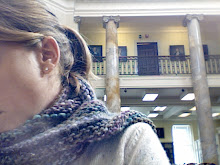 Upon the discovery of John Pierpont’s The American First-Class Book; or, Exercises in Reading and Recitation. Selected Principally from Modern Authors of Great Britain and America, and Designed for the Us of the Highest Class in Public and Private Schools. This is one of many American readers of the period (the 1830s-1850s), but the only one signed: “Abby May Alcott” (that’s Louisa’s little sister) and certainly the only one with the following scribbled note tucked inside the pages: "Please excuse Abbie for being late.--E.S. Alcott.” I have to assume that the note is from Elizabeth Sewall Alcott, another Alcott sister who died at age 23. The thing that cracks me up about this note is that it reminds me so much of the dynamic between Meg and Amy in Little Women. We all remember the episode of the pickled limes in the novel, right? Amy brings the tasty treats – and contraband – to the schoolhouse and is busted by the teacher who gives her a few hand lashes. This is the last straw for Amy in school, and Mrs. March, disgusted with her treatment, pulls her out. Beth (Lizzie), who has never been able to attend school because of her shyness and weak constitution, becomes her compatriot in home-schooling thereafter. That this note of excuse for Abbie comes from Lizzie’s hand suggests the latter’s overseeing her sister’s scholarly behavior. Or perhaps it was just pretty cool to hold the book that lay in the Alcott household, too see little Abby’s checkmarks next to certain selections. This discovery followed another cool one of yesterday, when I finally located something I thought existed but could never before find (below). It’s a Louisa M. Alcott reader for fourth-grade public school students, featuring really bizarre tales that often include really bizarre depictions of learning (by, for example, porcelain dolls and children made of bread…). I have long since been wanting to make claims about the way that Alcott circulated in actual curriculums, but I’ve struggled to find sufficient proof. This find goes a long way. Now if only the writing would follow….
Upon the discovery of John Pierpont’s The American First-Class Book; or, Exercises in Reading and Recitation. Selected Principally from Modern Authors of Great Britain and America, and Designed for the Us of the Highest Class in Public and Private Schools. This is one of many American readers of the period (the 1830s-1850s), but the only one signed: “Abby May Alcott” (that’s Louisa’s little sister) and certainly the only one with the following scribbled note tucked inside the pages: "Please excuse Abbie for being late.--E.S. Alcott.” I have to assume that the note is from Elizabeth Sewall Alcott, another Alcott sister who died at age 23. The thing that cracks me up about this note is that it reminds me so much of the dynamic between Meg and Amy in Little Women. We all remember the episode of the pickled limes in the novel, right? Amy brings the tasty treats – and contraband – to the schoolhouse and is busted by the teacher who gives her a few hand lashes. This is the last straw for Amy in school, and Mrs. March, disgusted with her treatment, pulls her out. Beth (Lizzie), who has never been able to attend school because of her shyness and weak constitution, becomes her compatriot in home-schooling thereafter. That this note of excuse for Abbie comes from Lizzie’s hand suggests the latter’s overseeing her sister’s scholarly behavior. Or perhaps it was just pretty cool to hold the book that lay in the Alcott household, too see little Abby’s checkmarks next to certain selections. This discovery followed another cool one of yesterday, when I finally located something I thought existed but could never before find (below). It’s a Louisa M. Alcott reader for fourth-grade public school students, featuring really bizarre tales that often include really bizarre depictions of learning (by, for example, porcelain dolls and children made of bread…). I have long since been wanting to make claims about the way that Alcott circulated in actual curriculums, but I’ve struggled to find sufficient proof. This find goes a long way. Now if only the writing would follow….


